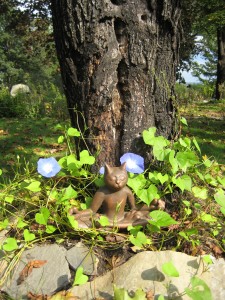In a dream, I witness a family with young children confronted with frightening events. They play a game where they race to outpace the impending disasters by creating stories that keep them at bay.
We tell ourselves stories, or stories are told to us, to spin reality and make us feel safe. We live in a time of great storytelling delivered through modern machines. Economies are now driven by handheld storytelling devices competing to deliver the latest story the fastest. Who can give us the latest image, joke, and spin in the fewest nanoseconds?
Meanwhile, the post-American Dream reality continues to debunk an illusory world long over. There are no real American corporations. Corporations are moneymaking entities with allegiance only to that which generates profit. America’s manufacturing has long left its shores in search of highest possible profit. America has become a Third World country that industry now seeks to exploit for its final riches—its natural resources. All this under the story of keeping America safe, secure and, of course, working!
When could we have imagined that fracking—a known disastrously carcinogenic procedure to obtain natural gas—is almost certain to be allowed in the midst of New York’s Hudson Valley, the major water supplier to millions of people in New York City. The storytellers are powerfully suggesting that it is the only American thing to do, to shore up our economy and preserve our independence. Such a “safe technology!” We are assured that our drinking water won’t be compromised. How reassuring!
The corporate world has wormed its way into the internet, the final frontier of free speech. Algorithms, ultimately programs designed to cater to our likes, secretly prejudice the information we call for and unleash the modern “hidden persuader” in search of our money. Watch TED talk:
What FACEBOOK and GOOGLE are Hiding from world.
So blinded are we by our own hunger for self-importance that we readily reveal all our likes and dislikes to Facebook, who’s algorithms digest the data and hand it, on a silver platter, to industry. And, we don’t care! As don Juan said: We are happy chickens in a chicken coop! Happily pecking away in our imprisonment, being fed to bursting.
Tweetie Bird, Twitter, has come of age as a scientific storyteller, yesterday revealing the universality of global mood shifts. The big news: people are happiest in the morning and on the weekend. How enlightening. With that news I can now be happy when I awaken and when the work week is complete, knowing that I’m normal, just like everyone else. Do we really need a “scientific study” from this giant storytelling machine to tell us something that we know by simply observing ourselves? Or have we come so far from knowing ourselves that we don’t know what we feel or when we feel it without Twitter’s enlightenment?
We are indeed in a time of great change. The old stories are folding and we anxiously grasp at our storytelling machines for calming new stories like the young family in my dream desperately seeking to stave off impending doom. I think it might be time to turn to an old story that presents a simple technique to find calm without a story.

There was once a Buddha who sat beneath the bodhi tree. He sat in utter stillness, calmly breathing, as apocalyptic and sensuous, lustful stories passed before him. He knew them all to be illusions and so he grasped at none of them, allowing none to plant seeds in his mind to generate worrisome, anxious or fearful attachment. Instead, he remained with the truth—unspun reality, simply what is—in utter stillness. With this he found his way to enlightening calm.
In a post-storytelling world of fully recapitulated truth we find our way into utter calm. Release the devices, find a nice tree to sit under, go inward and, in stillness, bypass attachment to the storytelling mind and allow yourself to stay present as the truths of the heart flow through you. Allow yourself to breathe the side to side sweeping breath, releasing untruths while consolidating inner truth.
Discover true calm,
Chuck

As I mention on our Facebook page, I think one underlying point Chuck is making is that the devices that we hold so dear are really tools. If we use them differently we can really change the world. The Wall Street protests now gathering such momentum are an example of the power of the internet. The words we choose to speak and write are important, just as important as our moments of calming and centering. If we are to be balanced, with a foot in both the inner and the outer world, we must constantly strive to make our time in each world as meaningful as we possibly can. Thanks, Chuck, for this great blog!